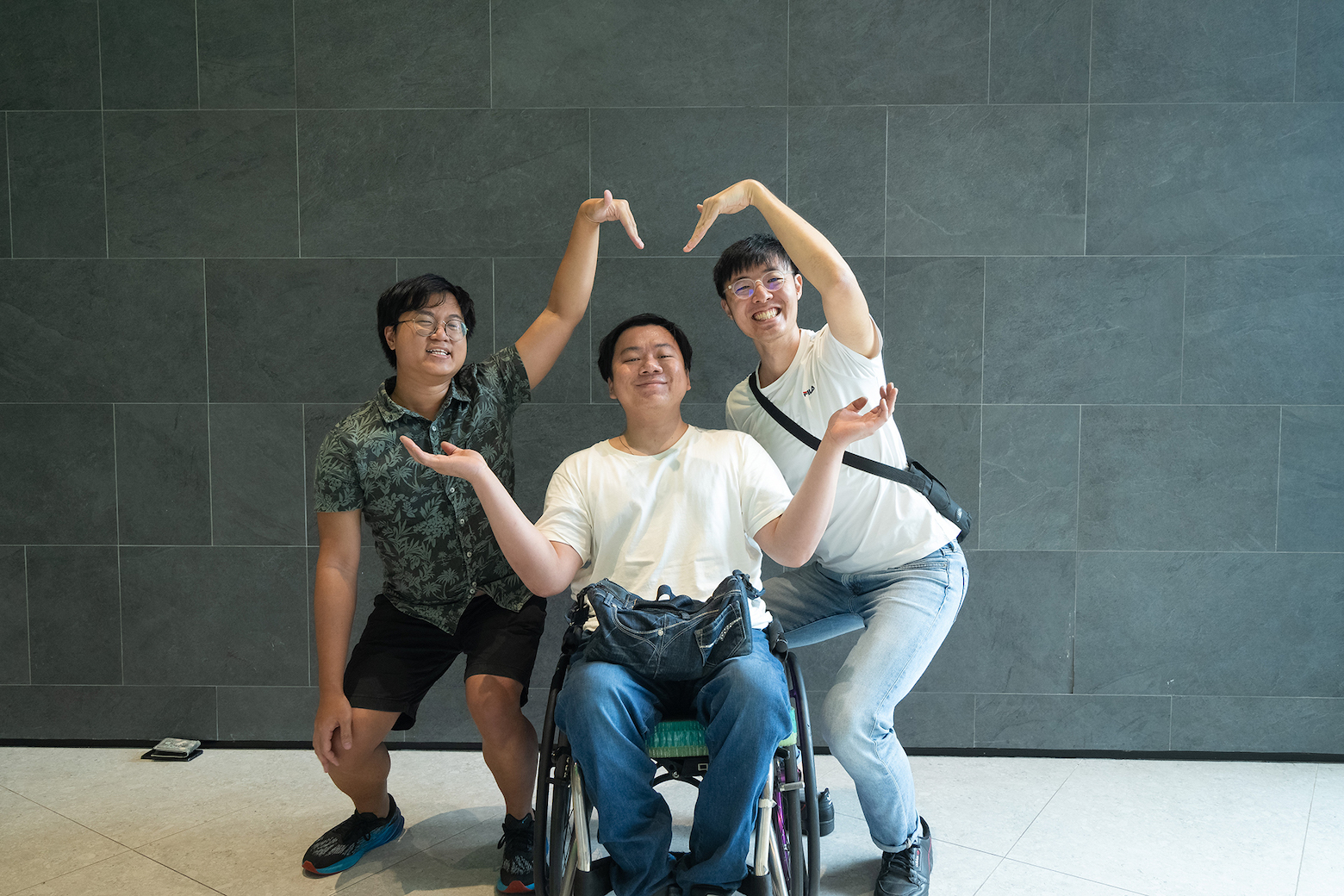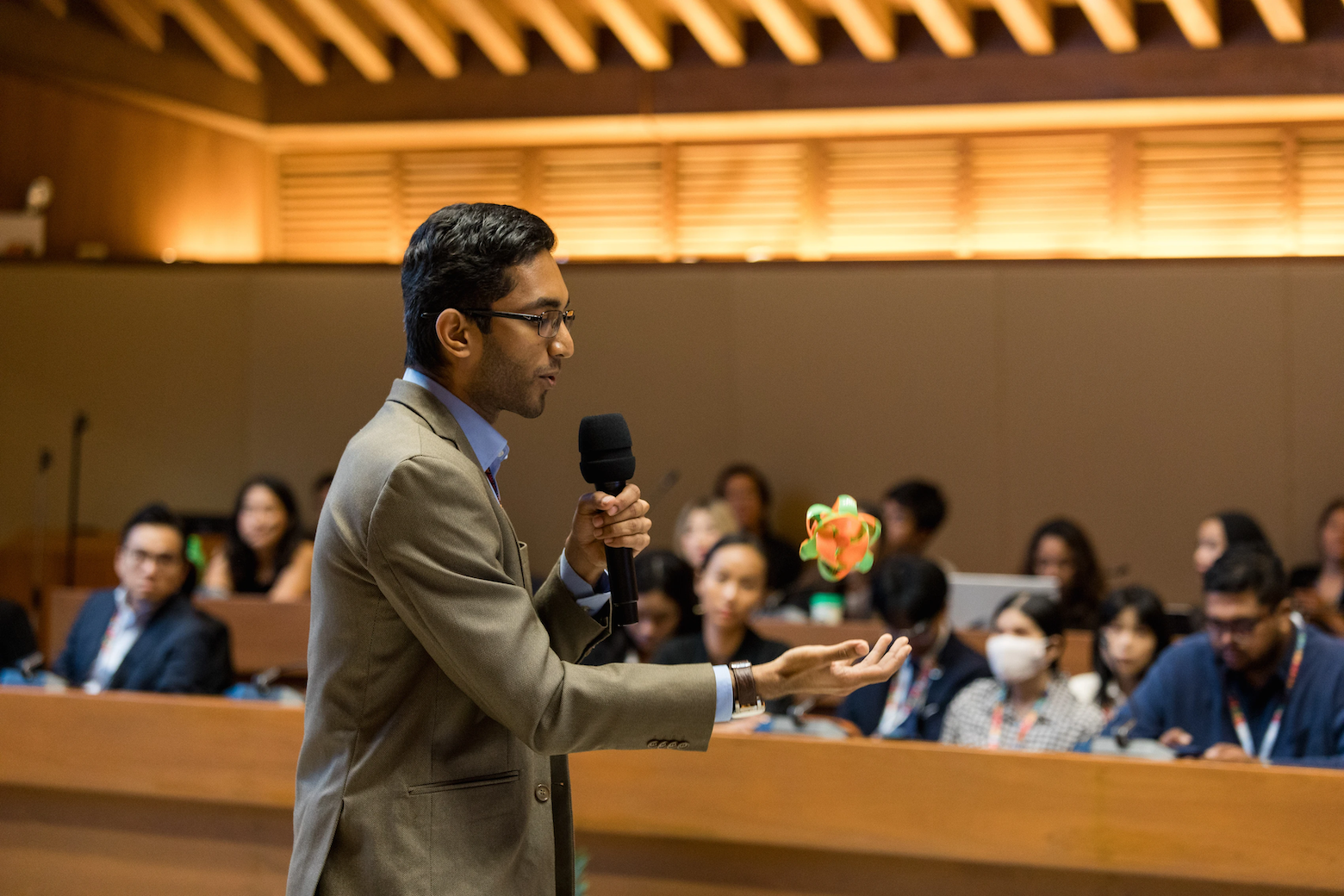Singapore Polytechnic student Alicia Hong, 19, is often approached by her parents and grandparents for help with using digital tools and platforms.
“They would come to me with things like ‘How do I do this PayNow thing?’ or ‘Is this email a scam or not?’,” says the design for communication and experience student.
Their recurring questions led to helplessness. “I thought that if they had to come to me each time for help, I was not solving the root problem,” says Ms Hong. “I wanted to do more to help but I didn't know how.”
Last February, a school project on tackling issues in society helped her to look at problems from a user’s perspective. She took it as an opportunity to focus on digital inclusion for seniors.
While there were existing initiatives and guides to help seniors, Ms Hong was exploring more effective ways to teach digital literacy. “We wanted to do something different and make it fun at the same time.”
Ms Hong, along with two friends, came up with the idea of developing physical board games that would teach the elderly how to use digital payments and identify online scams.
For example, to spend credits in the game, players have to use an accompanying mobile app that mimics real-life interfaces. Ms Hong adds that it was a way to familiarise the elderly with digital payments without using real money.
The team also developed a board game on scams; players consider various scenarios and must identify which ones are scams to progress in the game.
Why choose board games? It is an approachable format for seniors, to learn at their own pace and in a comfortable setting, says Ms Hong.
She feels that a traditional classroom setting may not work for all seniors, citing language barriers and a fear of embarrassment.
“They prefer to learn with their friends and family, so they can play as many times as they need to get the hang of it.”
Spurring innovation
Positive feedback from lecturers and family members led the team of five – with two new members – to join the Youth Action Challenge (YAC) last October to refine their project called Digi-Up!.
The YAC is a four-month programme that offers mentorship and guidance from industry professionals, and up to $50,000 in grants, to help turn youth ideas into reality.

“We learnt a lot during the YAC, including how to price a mobile app that we want to develop for our games later on,” says Ms Hong.
“Our mentor walked us through possible pricing models and, with his advice, we decided to go with a ‘freemium’ model where people can get the app for free, then pay for the online versions of our games,” she says. “This will allow users that worry about cost to still enjoy the experience.”
The team also received the highest grant amount of $50,000, and will use it to manufacture the board games, conduct workshops to train seniors to teach their peers how to play the games, and host game nights at community centres.
“Our goal is to help as many seniors as possible to be digitally savvy and comfortable using digital technologies,” she explains, adding that the team plans to officially launch both board games by November.
The team’s mentor is Mr Greg Tan, 42, co-founder and chief executive of social enterprise SG Assist, which supports the elderly, caregivers and others. “By promoting social connection and community engagement,” he says, “the board games can combat social isolation and boost overall well-being.
“Digi-Up! could revolutionise how to approach digital literacy among older adults.”
More adventures for the less mobile
Family outings are supposed to be a stress-free affair. But not so much for software consultant John Kwok, 31.
Bringing his late grandparents out – both wheelchair-bound – entailed planning ahead and navigating routes that were a non-issue for the able-bodied.
Even then, he says, such outings were reserved for special occasions such as birthdays. “We ended up going out to the same places that we knew were definitely wheelchair-accessible,” says Mr Kwok.
“So to spend time with them, we’d usually just go to their house,” he adds.
“I always felt like, what if they wanted to see something new? Or try something different? But the reality is that it can be quite tiring and difficult.”
Keen to help caregivers and persons with disabilities (PWDs), he joined the YAC with his fiancee Rachel Tang, 27, an IT consultant, and two friends to develop an idea of creating accessibility guides, calling it Accessible Adventures.

“We wanted to create a website with lifestyle guides for PWDs, such as reviews of restaurants that rate their accessibility, and promote them through other channels.”
Why join the YAC? Access to mentorship, guidance, and resources were key reasons that convinced the team to sign up. “Being part of the YAC also makes your project more credible to others you reach out to in the future.”
Mr Kwok notes that the team received crucial advice and suggestions on being financially self-sustainable, such as doing affiliate marketing with wheelchair vendors, or working with businesses that want to be reviewed for positive publicity.
Receiving a $50,000 grant, Mr Kwok and his teammates – one of whom is a wheelchair user – will bolster their guides and content, and provide incentives for caregivers and PWDs to test their guides.
The team also plans to set up booths at events such as the Purple Parade – an annual event to support the inclusion of PWDs – to promote their work and content.
“We hope that our project will make accessibility issues become part of the public consciousness,” says Mr Kwok.
Mr Tan Ye Sheng, 35, an angel investor and the team’s mentor, says: “The team’s solution can make our society more equitable and inclusive. Hopefully, they can scale it regionally to the urban areas of our neighbouring countries too.”
On the Youth Action Challenge, Mr Tan says: “It’s heartening to know there are youths who are working adults, who still take time to address such social issues with passion.”
Taking ideas abroad
Mr Vairavan Ramanathan, 28, found presenting his team’s work at the Youth Co:Lab Summit last year exhilarating.
At the Youth Action Challenge’s (YAC) fourth season from October 2022 to January last year, his team pitched an initiative – Project Enigma – to tackle waste in the toy industry through toy rental services and workshops, among other methods.
“Being able to share our humble work on a regional stage made me feel like a rock star. Peers from different nations saw our mission as a worthwhile endeavour,” says Mr Ramanathan, the executive director of Project Enigma.

He adds how the summit, in Bangkok, opened up opportunities for collaboration across borders, and the possibilities of consulting work and franchising with partners in the region.
The overseas trip was made possible through the National Youth Council’s (NYC) partnership with the Youth Co:Lab initiative, co-created by the United Nations Development Programme (UNDP) and Citi Foundation.
The initiative aims to establish a common agenda for Asia-Pacific nations to invest in and empower youth, to help meet the UN Sustainable Development Goals.
“As a key partner, Youth Co:Lab supports the YAC by providing networks and access to funders and accelerator programmes locally and in the wider Asean region,” says Ms Karen Lee, director (Partnership Lab), NYC.
As part of each YAC season, two teams are chosen to represent Singapore in the annual Youth Co:Lab summit.
Ms Lee adds: “This provides them with the opportunity to network with fellow young changemakers in the region, fostering collaboration and knowledge exchange.”
This was produced in partnership with the National Youth Council

